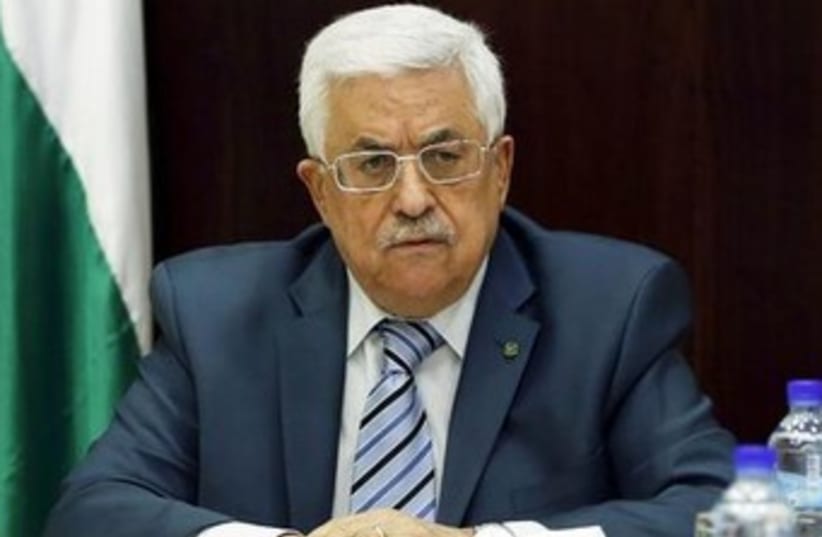The Palestinian Authority’s campaign of Jew-hatred and anti-Israel venom is getting worse. A powerful presentation by Israel’s Office of Strategic Affairs, led by Minister Yuval Steinitz and his director- general, Brigadier-General (res.) Yossi Kupperwasser, highlights the increasing vehemence of these attacks, which include Nazi references. Although thoroughly documented by the Palestinian Media Watch (PMW) and Middle East Research Institute (MEMRI), and reported briefly by The New York Times, the issue has been largely ignored by international media, probably because it is so common.That incitement is rampant throughout PA media is nothing new; it has been there from the very beginning of what is called “Palestinian nationalism,” indoctrinating generation after generation in Jew-hatred. And it violates all agreements signed by the PA. What is strange, however, is that the Israeli government has done nothing to stop it.Although government officials raise the issue, there has been no attempt to make it a condition for continuing negotiations, releasing terrorists, or giving the PA money and other “confidence building” benefits.
Without incurring any penalty for engaging in incitement and generously funded by the US, EU governments and private organizations, the PA has no incentive to stop disseminating hate propaganda. It’s business as usual.As disgusting and offensive as PA incitement is, however, its persistence may be due to a fundamental misunderstanding.Incitement is not a superficial aspect of Palestinianism; it is its core, explicit in the Palestinian National Covenant and Hamas Charter. Except for a few historical and procedural references, every article of the PLO Covenant contains incitement; Hamas’ Charter is even worse.They represent everything for which Yasser Arafat and his followers stand. Understanding Arafat, “the father of Palestinian nationalism,” therefore, is critical.Arafat was not a nationalist; he was a terrorist leader dedicated to eliminating Israel, not to building a state alongside it. His goal was no different than that of other jihadists and Islamists, Shi’ite and Sunni. They do not want a “twostate solution” that leaves Israel intact; as Arafat said, that’s only the means to a genocidal end.Asking the PA to end incitement, therefore, is equivalent to demanding an end to Palestinianism – the promotion of a malignant culture focused on wiping out Israel. The only common bond that unites Arab Palestinians, incitement is a substitute for genuine national identity; it is their revenge for victimhood.Those who delude themselves into believing that another Palestinian state alongside Israel will compensate for the “Nakba,” the catastrophe caused by Israel’s establishment, do not understand why anti-Jewish incitement is such a powerful element in Palestinian culture. It is not incidental; it is inherent.It doesn’t matter to Arabs if Jew-hatred is self-destructive, or if Israel makes concessions and compromises. As Arafat made clear, “peace” is only a word; it must never distract from the goal to destroy Israel and thereby redeem Arab honor.In their eyes, the “injustice” done in establishing the State of Israel and creating Arab Palestinian refugees cannot be forgiven or forfeited for a piece of land and a flag.Incitement is their anthem to Arab Palestinian pride and self-respect. It is the soul of the Palestinian revolution and its goal, to “liberate Palestine” – all of it.That’s why the PLO Covenant has never been changed and why Arab Palestinian nationalism and incitement are integral. And that’s why efforts to combat PA incitement have failed and will continue to fail – along with two-state plans.The solution requires refocusing away from statehood, and forcing Arab Palestinian leaders to choose between continuing incitement and support for their political and economic aspirations. No doubt the international community will continue to ignore this issue, as they have done for decades, but they must understand the consequences: it will embolden Arab intransigence, fuel more hatred and prevent any progress toward peace.Ending incitement should be a prerequisite for any future financial support and political involvement, including diplomatic recognition. It is moral, reasonable and practical.The struggle against PA and Islamist incitement, therefore, is one of the most crucial elements in the war against terrorism because it strikes at the motivation for people to murder “for the sake of Allah,” and “Palestine.”We should not underestimate the effort this entails. It means rejecting everything for which Arafat and his followers fought, died and continue to fight. It means ending their armed struggle, “the resistance” and terrorism. It means changing priorities.It’s not easy, but It’s the only ground in which hope can take root.The writer is a PhD historian, writer and journalist.PA incitement is entrenched and getting worse
That incitement is rampant throughout PA media is nothing new; it has been there from the very beginning of what is called “Palestinian nationalism,” indoctrinating generation after generation in Jew-hatred.
